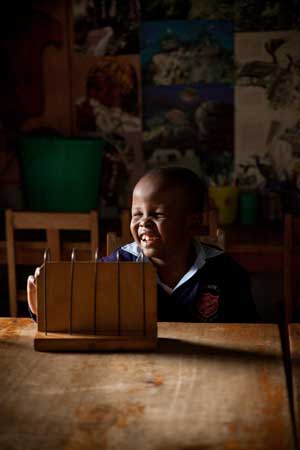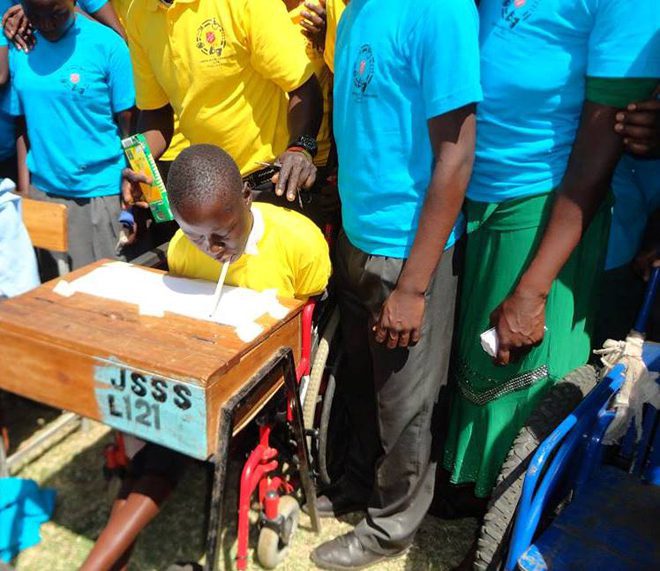By Jolene Hodder, Commissioner
 The Salvation Army in Kenya has a nearly 70-year history of service to disabled persons, particularly disabled children who are often rejected by their families and communities and unable to attend school. The Army runs a number of schools specifically for them, a place for each one to achieve his or her full potential.
The Salvation Army in Kenya has a nearly 70-year history of service to disabled persons, particularly disabled children who are often rejected by their families and communities and unable to attend school. The Army runs a number of schools specifically for them, a place for each one to achieve his or her full potential.
The Kenya Demographic and Health Survey estimates that over 10 percent of the nation’s population is mentally or physically disabled. According to the World Health Organization, this is primarily due to accidents (road and domestic), malaria, measles, congenital diseases and leprosy. The issue is compounded by a lack of adequate health care and the risk of abuse. The Lancet, a leading general medical journal, reported in 2012 that disabled children worldwide are at nearly four times greater risk of physical, sexual or emotional abuse or of neglect than children who are not disabled.
Within this context The Salvation Army began work in Thika among the disabled in 1946 when it sought to assist soldiers blinded during World War II. That program grew into the country’s first education and training center for the blind. The Army’s Thika School for the Blind was so successful that it led to the founding of many different institutions across East Africa.
 In the Kenya West Territory alone, the Army today operates or sponsors 12 schools and 12 units for the disabled. While these programs are registered with the government, countless unregistered schools are run or supported by the Army as well. Many lack running water, electricity, books and other fundamental resources. Some schools do not have enough beds or adequate food for the over 5,000 children who come for help annually.
In the Kenya West Territory alone, the Army today operates or sponsors 12 schools and 12 units for the disabled. While these programs are registered with the government, countless unregistered schools are run or supported by the Army as well. Many lack running water, electricity, books and other fundamental resources. Some schools do not have enough beds or adequate food for the over 5,000 children who come for help annually.
Since 1992, the United Nations has promoted an International Day of Persons with Disabilities to encourage an understanding of disability issues and mobilize support for the dignity, rights and well-being of persons with disabilities. Thus, to highlight the Army’s work and empower its children the Kenya West Territory held its first International Day of Persons with Disabilities celebration on Dec. 3, 2013. Under the leadership of Major Eleanor Haddick, territorial social and sponsorship secretary, the students planned and led the event. They provided translation, music and entertainment, gave tours of the school, and displayed arts and crafts.
In total, 389 students from 10 schools and three units gathered at Joyland Secondary School in Kisumu for the festivities. Roughly 175 invited guests joined them, including family members, teachers, headmasters and territorial headquarters staff. Lt. Colonels Edward and Shelley Hill, from the USA Western Territory, were the international guests.
“This is our time to shine and to show that it is not our disability that should matter, but our abilities, for we have been blessed with many,” said the day’s emcee, Peter Otieno, a physically-disabled boy from Joyland. “Today no one is excluded, but all are included because we are all God’s children. He has a plan for each one of us, and as Scripture says, through God all things are possible.”
Visually-impaired students from the Kibos School spoke. “Although we may not be able to see well with our eyes, we do see with the heart, and our other senses are all heightened,” they said. “So we can sense the presence of God, and we know that, if we let him, he will use us to bring blessings to others. We do not want your sympathy. We simply ask that we be given the same respect and opportunities as anyone else so that we can take our rightful place in society. We do not want to be treated as different, but as equals.”
Through Haddick, mentally-challenged students from Kuywa School and Shavahiga Special Unit asked attendees to consider their situation: “If you have ever felt lost, confused or unable to understand a situation, instruction or task, then you too have been mentally challenged. Being mentally challenged does not mean we are stupid or incapable of learning. It just means that new ways are needed to stimulate our minds. Through music, pictures, art, drama and play, every child that is mentally challenged can become a participating member of the community.”
As I watched the children share their God-given gifts and talents, I thought of the quote by Albert Einstein: “Everybody is a genius. If you judge a fish by its ability to climb a tree, it will live its whole life believing that it is stupid.”
He was right. All of God’s children are beautifully created with a God-given purpose. It’s The Salvation Army’s mission in the Kenya West Territory to help these disabled children recognize how exceptional they truly are, discover their gifts, and then fulfill God’s will for their lives.












